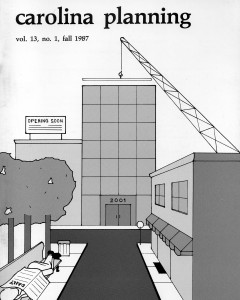 Volume 13.1 Cost Recovery Fees (1987)
Volume 13.1 Cost Recovery Fees (1987)
In searching for responsive, innovative ways to provide capital facilities, public services, affordable housing, and other municipal needs made more pressing by new growth and subsiding federal aid, many towns have adopted or are investigating impact fee programs. Alternatively called cost recovery or development fee programs, impact fee programs aim to charge developers their fair share of the costs imposed by their developments. Widespread agreement on what is and is not “fair” has not been reached, and there are compelling arguments both for and against the use of such fee systems as expedient, equitable, legitimate service delivery conduits. Because development fees are increasingly the subject of both praise and criticism, much of this issue comprises discussion about them.
Editors: Russell Berusch, John DiTullio, Irving Boykins, and Heidi Walter
A digital version of this issue is available here.
| APPLYING THE RATIONAL PLANNING MODEL TO RECREATION PLANNING IN SOUL CITY
Lockman, John; Peloquin-Dodd, Mary
|
| COMMENTS ON THE EQUITY, EFFICIENCY, INCIDENCE, AND POLITICS OF IMPACT FEE METHODOLOGIES
Duncan, James B.; Standerfer, Norman The authors caution local officials against jumping on the development fee bandwagon and using fees to raise new revenues rather than as a regulatory measure to meet growth needs. |
| WHO BEARS THE COST?
Siemon, Charles The author explores whether impact fee programs violate principles of planning and the due process of law, both of which have been integral to modern planning law. |
| COST RECOVERY FEES: A PROPOSAL FOR WILMINGTON, NORTH CAROLINA
Shuford, Scott This article discusses the guidelines and methodologies that the City of Wilmington, North Carolina used in designing a cost recovery system in the face of rapid growth. |
| MENTAL BARRIERS TO LEARNING AND CREATIVITY IN TRANSPORTATION PLANNING
Richmond, Jonathan Planners & politicians tend to render the complex in black-and-white. Technological metaphors play an important part in this self-delusion. Analysts rely too much on quantitative techniques for certainty. And politicians are too easily swayed by technological fixes, ignoring the abstract difficult questions of social values. These themes are explored with a case study of transportation planning in Southern California. |